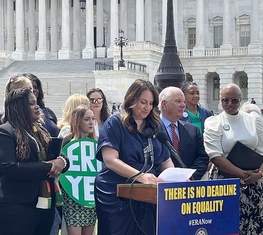Pennsylvania State Conference of the NAACP v. Chapman (now Schmidt)
Case Summary
LWV Pennsylvania and co-plaintiffs filed a federal lawsuit, seeking to count thousands of absentee ballots that were rejected due to errors with dating signatures on the return envelopes. The lawsuit asserts that failing to count the ballots, which were properly sealed and returned before the statutory deadline, violated the Materiality Provision of the Civil Rights Act and the Voting Rights Act.
The League of Women Voters of Pennsylvania, the Pennsylvania State Conference of the NAACP, and other co-plaintiffs filed a federal lawsuit in the Western District of Pennsylvania seeking to count several thousand absentee ballots that were rejected in the 2022 general election due to errors or omissions in dating voters’ signatures on return envelopes.
LWV of Pennsylvania had previously moved to intervene in a related state court lawsuit, which did not result in the necessary relief for voters.
Pennsylvania law requires that voters using absentee ballots must place their ballot in a secrecy envelope and then place both into a pre-addressed return envelope. The return envelope contains a voter declaration which must be signed by the voter and dated. Ballots must also be received by election officials by 8pm on Election Day to be counted.
The ballots at issue had been received by election officials before the statutory deadline and properly signed and sealed. The return envelopes were either missing dates next to voters’ signatures, or had incorrect dates, as determined by election officials.
The League’s complaint asserted that failing to count these ballots would violate the Materiality Provision of the Civil Rights Act of 1964, and the Equal Protection Clause of the Fourteenth Amendment. The Materiality Provision forbids disqualifying voters because of errors on ballots or paperwork necessary to vote unless the deficiencies are material to determining whether someone is legally eligible to vote. The plaintiffs also argued that not counting the ballots violated the Equal Protection Clause of the Fourteenth Amendment, as Pennsylvania state law counts military and overseas voters’ absentee ballots with errors, so long as the errors do not prevent election officials from determining one's eligibility to vote. By contrast, election officials did not count ordinary ballots from voters in Pennsylvania that had similar deficiencies. According to the plaintiffs, the state had no legitimate or compelling interest in creating such a distinction.
The plaintiffs requested the court to order the ballots to be counted and to forbid rejecting ballots solely for missing or incorrect dates on the return envelope in future elections.
The League and co-plaintiffs are represented in this matter by American Civil Liberties Union (ACLU), the ACLU of Pennsylvania, and Hogan Lovells US LLP.
LWV Timeline
LWV Pennsylvania files complaint
LWV of Pennsylvania, the Pennsylvania State Conference of the NAACP, and several co-plaintiffs file a lawsuit in the Western District of Pennsylvania. The complaint argues that not counting absentee ballots solely because of incorrect or omitted dates on return envelopes violates the Equal Protection Clause of the Fourteen Amendment and the Materiality Provision of the Civil Rights Act.
Republican Party intervenes in lawsuit
The court grants a motion by the Republican Party of Pennsylvania, the National Republican Congressional Committee (NRCC), and Republican National Committee (RNC) to intervene in the case as defendants.
United States DOJ files statement of interest
The United States Department of Justice files a Statement of Interest arguing the Materiality Provision of the Civil Rights Act applied to the voter declarations in question and that errors and omissions on their dates did not relate to whether a signatory was qualified to vote. The Department also asserts private litigants can enforce the Materiality Provision.
District court denies motion to dismiss
The district court denies the motion to dismiss brought by the RNC, NRCC and Republican Party of Pennsylvania, ruling that the plaintiffs had brought sufficient claims under the Materiality Provision of the Civil Rights Act and Fourteenth Amendment to prevent dismissal.
Court rules on cross motions for summary judgment
The court finds plaintiffs, including LWV Pennsylvania, have standing to pursue their claims. The opinion partially grants plaintiffs' motion for summary judgment, ruling that not counting timely received, sealed, and signed ballots because of a missing date violated the Materiality Provision of the Civil Rights Act. The court dismisses plaintiffs' equal protection claim and denies the RNC's motion for summary judgment on the Materiality Provision.
Republican party appeals summary judgment ruling
The Republican Party intervenors appeal the district court's summary judgment rulings to the Third Circuit Court of Appeals.
Third Circuit holds oral argument
After accepting the intervenors' appeal of the district court's grant of summary judgment, a three-judge panel of the Third Circuit Court of Appeals consisting of Judges Schwartz, Chung, and Ambro holds oral argument.




